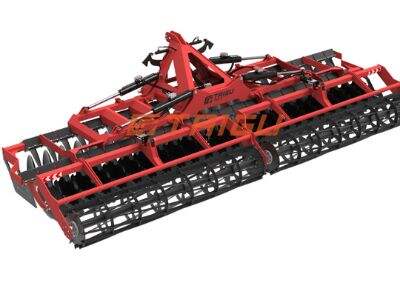Looking for the perfect hoe for loosening soil for planting? If so, you might be questioning the differences between rotary cultivators and power harrows and which one of them would be the better choice for you we’re here to help explain the main differences between these two soil engagement tools and help you decide which one you should purchase for your farm.
The subtleties of the rotary tiller vs Power Harrow Clearly, these being two completely different tools, they have very different purposes.
Industrial Rotary tillers are used to work in the row to prepare the seedbed for planting and are also in turn used in commercial horticultural applications Rotovators consist of knives and are often confused with rotary tillers, but are much lighter weight and are specifically meant for small garden use such as breaking new ground. A rotary tiller is a tractor attachment with a series of rotating blades that dig into the earth and prepare your soil for planting. In contrast, a power harrow has spinning tines which operate the soil but in a less aggressive way making a finer seedbed without digging as much.
Factors to consider in choosing between a rotary tiller or a power harrow
When selecting a rotary tiller vs power harrow there are several considerations. The tool that will serve you best depends on the size of your operation, the soil that you have and the types of crops you will be planting. If you have acres of heavy clay, a conventional rotary tiller may be a better option for breaking up compacted soil. If you have light soil, or plan to sow delicate crops, however, a power harrow is a good choice.
Pros and cons of rotary tillers vs power harrows
There are many types of garden cultivation equipment on the market, and one popular option is the rotary tiller, which can break up hard soil and prepare it for planting. They're also all purpose, so they can be used for different soil preparation tasks. But splash guards can be harder to move around, especially in small areas or with hilly surfaces.
Power harrows, meanwhile, are praised for producing a fine seedbed, working the soil lightly. Perfect for preparing soil for planting with small crops or in locations where minimal soil disturbance is desired. Power harrows however, may not be as aggressive in breaking up compacted soil than a rotary tiller.
What kind of soil preparation tool is suitable for my unique farming use?
When choosing which soil prep tool is right for you, consider factors such as the size and type of your farm, the condition of your soil, and the crop you are planting. 4) Power Harrow If you’ve small farm and the soil are light, and you’re sowing delicate seeds power harrow may be the best choice for you. But, if you have a large-scale farm with a heavy soil that's tightly compressed, you might consider making use of a rotary tiller instead.
Taigu suggests evaluating your own farm and meeting with a specialist to see which piece of soil preparation equipment will work best for you. By selecting the correct tool for your job, you can guarantee your soil will be ready for seeding and that your plants will grow healthy!
Power harrows – the ultimate guide featured image What type of soil preparation do I need?
In... Summary Both rotary tillers and power harrows have their own pros and cons in soil preparation. Your specific farming needs and current condition of your soil should be taken into account before you select between the two devices. Rotary tillers can power through tough, compacted soil, whereas power harrows prepare a fine seed bed for fragile crops.
Ultimately, the most effective soil preparation tool for you will vary depending on your unique farm and the crops you are working to grow. weigh the differences between rotary tillers and power harrows, assess yourneeds and decide which implement will best achieve the results you desire in yourfields. With the right prepping tool, your crops will thank you.
Table of Contents
- The subtleties of the rotary tiller vs Power Harrow Clearly, these being two completely different tools, they have very different purposes.
- Factors to consider in choosing between a rotary tiller or a power harrow
- Pros and cons of rotary tillers vs power harrows
- When choosing which soil prep tool is right for you, consider factors such as the size and type of your farm, the condition of your soil, and the crop you are planting. 4) Power Harrow If you’ve small farm and the soil are light, and you’re sowing delicate seeds power harrow may be the best choice for you. But, if you have a large-scale farm with a heavy soil that's tightly compressed, you might consider making use of a rotary tiller instead.

